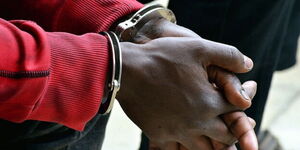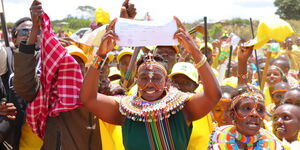Previous general elections in Kenya have seen millions of voters turn out on election day, resulting into long queues at polling stations.
With 22.1 million (22,120,458) eligible voters registered to take part in the August 9 polls, the majority will be looking to exercise their democratic right early and wait for the results or probably go back to their daily routine.
Kenyans.co.ke looks at some of the tricks that Kenyans have used to jump the queues on the election day, but first, a look at how the electorate can verify their election details.
Verification of Polling Stations
Registered voters can verify their polling stations on the Independent Electoral and Boundaries Commission (IEBC) website - https://verify.iebc.or.ke/.
Once logged in enter your National Identity (I.D) card or passport numbers and year of birth and click the 'check now' to receive information on your poling centre (school) and poling stations (specific class) where you will vote.
Registered voters can also send their ID or passport number to 70000. This verification is important to know where you will cast your ballot and save you time on the material day.
IEBC has put in place measures to make the voting efficient by not only increasing the number of polling stations but also capping the number of voters per station at 700.
Tricks Used to Jump Long Election Queues
1.Turning up very early or fashionably late
The unwritten rule of any election, like when seeking government services is that the earlier you get there, the faster you served. This has seen Kenyans arrive at polling centres as early as 3.00 am - three hours before the official opening time of polling stations - 6.00 am.
For many, the assumption is that during the early hours, the officials, as well as the machines used are 'fresh'. In addition, a possible lag in the systems caused by multiple data entry at peak hours is also less-likely to happen.
On the flip side, others opt to arrive fashionably late at the polling stations when the push and pull witnessed on voting queues is no longer there.
2. Deliberately queuing on the wrong line
Voters in each polling centre are divided in polling stations, with the list following an alphabetic order. Due to varying turn-out, some queues may be longer than others.
The electoral commission has deployed polling clerks at each station whose roles include directing voters to the right poling station. Given that one is assumed to have innocently queued on the wrong line, an exception may be made to allow you to jump the line on your rightful station.
However, sly Kenyans have taken advantage of this to deliberately beat the congestion. Their success depends on the compassion of the officers or the voters lining up at the right polling station.
3. Borrowing and hiring of babies
The poll agency has listed expectant and lactating mothers as among those who should be given priority to vote owing to their condition which does not allow them to queue for long hours.
Alive to this, some Kenyans cunningly 'borrow' children from friends and neighbours so that they are exempted from the long queues. Other mothers dangerously hire out their children for this purpose.
In addition, others show up with fake pregnancies while some may slip past the election officials and security, others are caught up with and sent to the back of the line.
4.Faking disabilities
Eligible voters who are physically challenged also fall in the priority list of the IEBC - with no measure put in place to ascertain the nature and level of disability.
Consequently, daring Kenyans go as far as hiring crutches or wheelchairs or feign injury in a bid to jump queues, depending on the compassion of the police manning each station.
5. Helping the elderly on vulnerable
IEBC allows the elderly and other listed vulnerable persons, including the elderly and the illiterate in society to be assisted to cast their vote during the election date.
Their aides are allowed to vote at the same time. In past elections, the citizenry have taken advantage of this and sought these individuals offering help, in exchange of prompt voting.












